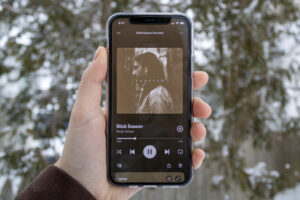Rating: 4.5 out of 5 stars
Thirteen years after her debut album, Taylor Swift emerges once again at the top of the music scene, closing out the summer with her seventh studio album, “Lover,” released on Aug. 23. The album, within the first week of its release, hit No. 1 on the Billboard 200 chart, a typical feat for the country-turned-pop star. But the pastel colors of the album, a stark contrast to the black and white of her last album, leave a lot to unpack.
Over the course of these 13 years, Swift has been through various phases, all reflected in her music. But in the past four years, since making the official switch from country to pop with her album “1989,” she’s received more judgment and scrutiny from the public than many other pop stars and celebrities — and she’s reacted.
Swift’s 2017 album, “Reputation,” was dark. It was an attempt at an edgy, bad-girl style that didn’t quite align with Swift’s strengths as an artist. The album sales reflected this as well; though it has now sold millions of copies, “Reputation” took 18 weeks to hit the two million milestone, while nearly all of her previous albums hit two million in less than seven weeks.
But two years of growth since then have given Swift the opportunity to take her music in a different direction. While “Lover” isn’t exactly the light, fun pop-style that “1989” was, it’s also nothing close to the edginess of “Reputation.” Instead, it’s just about the perfect mix of the two.
The album includes not only some classic, catchy, love songs that have listeners singing along, possibly using any nearby item as a fake microphone (hairbrush, bottle of wine, etc.), but also a handful of songs with a different sort of message. In the album’s fourth song, “The Man,” Swift addresses the sexism that she has faced throughout her career, a battle both she and other female celebrities have been fighting for years. The chorus, “I’m so sick of running as fast as I can / wondering if I’d get there quicker if I was a man,” speaks volumes to the extra mile women often have to go in the professional world just to keep up.
The second single Swift released from the album also tackles some political and personal issues for Swift. “You Need To Calm Down” is a bouncy pop-anthem with a chorus that’s hard not to sing along to. The song serves two purposes by not only giving support to the LGBTQ community but also by directly addressing her critics. Unlike “Reputation,” she chooses to tackle the various issues in this album with a more lighthearted tone, keeping the songs catchy and listenable. The messages are there, but the undercurrents of bitterness and anger that were present in “Reputation” are not.
In terms of the love songs, Swift has hit her stride. From bouncy pop songs like “Paper Rings,” “Cruel Summer” and “London Boy” (among others) to the chilled-out, more acoustic style of “Lover,” “The Archer,” “Daylight” and “Afterglow,” Swift provides us with memorable lyrics, catchy choruses and relatable storylines. Yet a standout among them all actually features hints of some uncharted territory for the artist: jazz. “False God,” the 13th song on the album, opens with saxophone and maintains a jazzy tone throughout. The pre-chorus for each verse even includes Swift nearly talking, rather than singing, before hitting the chorus. The lyrics address both physicality and emotion, with one of many standout lines touching on both as she opens the second verse, “I know Heaven’s a thing / I go there when you touch me Honey / Hell is where I fight with you.”
Overall, with “Lover,” Swift shows the world she has moved on from her “Reputation” phase. The edges are rounded, the colors have seeped back into her music and look, and though we all likely need to accept that the country Taylor Swift we grew up with is gone for good, “Lover” shows us that she still knows how to give us exactly what we need.











